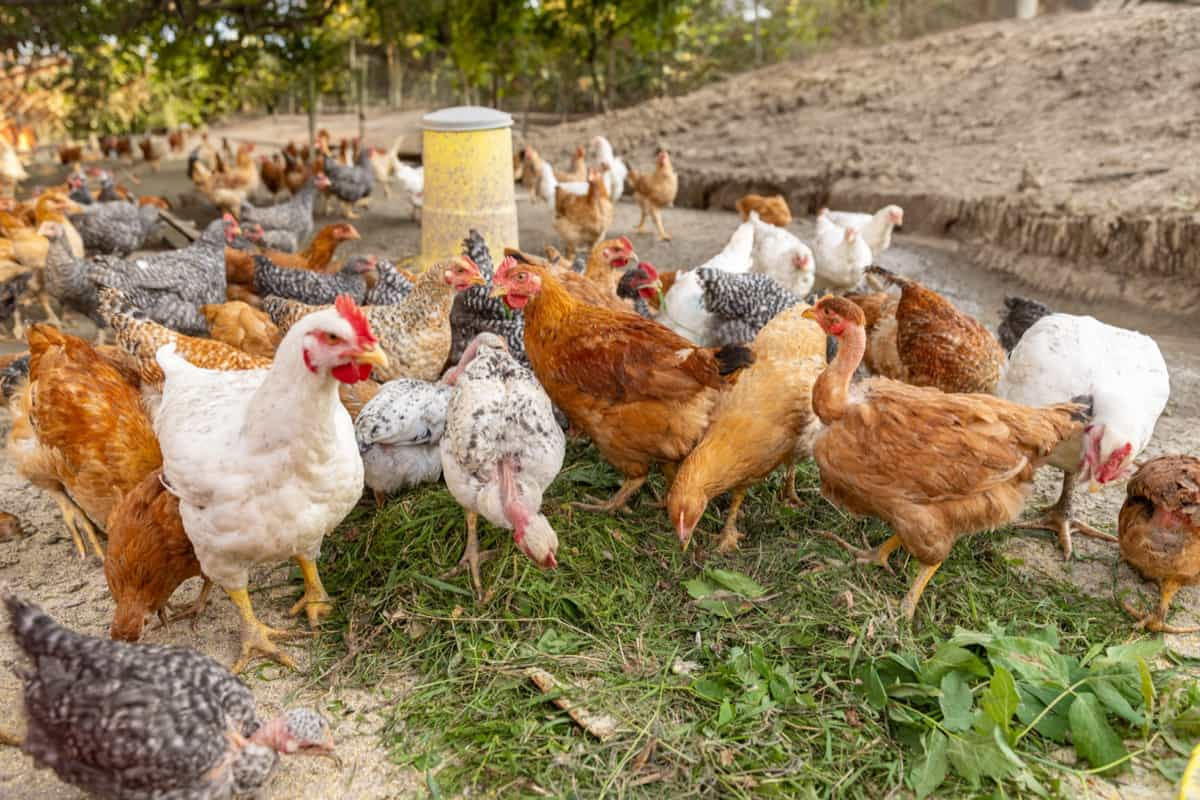Chickens are important to many households and farms, providing fresh eggs and meat. However, like other living beings, chickens can fall ill and require proper care and treatment. One effective and natural way to promote the health and well-being of your flock is by incorporating medicinal herbs into their diet. This article will explore how to keep your chickens healthy with medicinal herbs.

How to Keep Your Chickens Healthy with Medicinal Herbs
Benefits of Using Medicinal Herbs for Chicken Health
Boosting Immunity: Medicinal herbs such as echinacea, garlic, and oregano can help strengthen the immune system of chickens. These herbs contain natural compounds that enhance the production of white blood cells, which play a vital role in fighting infections and diseases.
Promoting Digestive Health: Herbs like chamomile, peppermint, and fennel can aid in maintaining a healthy digestive system for chickens. These herbs are anti-inflammatory and help alleviate digestive issues like indigestion, diarrhea, and bloating.
Enhancing Respiratory Function: Chickens are prone to respiratory problems, especially during colder months. Herbs such as thyme, sage, and mullein have expectorant and antimicrobial properties that can help clear congestion, reduce inflammation, and support respiratory health in chickens.
Herbal Remedies for Common Chicken Ailments
Coccidiosis: It is a common intestinal disease in chickens caused by the coccidia parasite. Medicinal herbs like oregano and thyme can be used as natural remedies to control and prevent coccidiosis. These herbs contain antiparasitic compounds and can help reduce the parasite load in the chicken’s intestines.
Feather Pecking: Feather pecking is a behavioral problem that can lead to feather loss and skin damage in chickens. Herbs like lavender and chamomile can calm and relax the chickens, reducing stress and the likelihood of feather-pecking behavior.
Respiratory Infections: Respiratory infections, such as infectious bronchitis and mycoplasma, can impact the respiratory health of chickens. Medicinal herbs like eucalyptus, garlic, and oregano can help alleviate symptoms and support the chicken’s immune system during respiratory infections.
In case you missed it: 8 Best Alternative Ways to Raising Chickens Without a Coop

Understanding the Safety and Dosage of Medicinal Herbs for Chickens
- Quality and Source: Ensure you source high-quality medicinal herbs from reputable suppliers to guarantee their efficacy and safety.
- Dosage: Follow recommended dosage guidelines provided by experts or veterinarians experienced in poultry health. Dosages may vary based on the herb, the chicken’s age and weight, and the specific ailment being treated.
- Withdrawal Period: If you use medicinal herbs for chickens for meat or egg production, be aware of withdrawal periods. Some herbs may require a specific time frame before consuming the chicken’s products to avoid potential residues.
- Observation: Monitor your chickens closely after introducing medicinal herbs. Look for any adverse reactions or changes in behavior. If any issues arise, consult a veterinarian promptly.
How to Incorporate Medicinal Herbs into Your Chicken’s Diet
Fresh Herbs: One easy way to incorporate medicinal herbs is by adding fresh herbs to your chicken’s feed or water. Some commonly used herbs include oregano, thyme, basil, and sage. These herbs add flavor and provide various health benefits for your chickens.
Dried Herbs: Another option is to use dried herbs. Drying herbs preserves their medicinal properties and makes them easier to store and use. You can crush and mix the dried herbs into their feed or sprinkle them over their bedding.
Herbal Infusions: These are a great way to provide your chickens with the benefits of medicinal herbs. Steep the herbs in water overnight for a few hours, then offer the infused water to your chickens. This can help improve their digestion and boost their immune system.
The Role of Medicinal Herbs in Boosting Chicken Immunity
Antioxidant Properties: Many medicinal herbs are rich in antioxidants, which help protect the chickens’ cells from damage caused by free radicals. This can strengthen their immune system and improve their overall health.
Antibacterial and Antiviral Effects: Certain herbs, such as garlic and echinacea, have natural antibacterial and antiviral properties. These herbs can help prevent and fight off various bacterial and viral infections that chickens may be susceptible to.
Anti-inflammatory Benefits: Inflammation can weaken the immune system and make chickens more susceptible to diseases. Medicinal herbs like turmeric and ginger have anti-inflammatory properties that can reduce inflammation and support a healthy immune response.
Top Medicinal Herbs for Respiratory Health in Chickens
Eucalyptus: Eucalyptus leaves or essential oils can benefit chickens with respiratory issues. The aroma of eucalyptus can help clear the airways, making breathing easier for your flock.
Mullein: Mullein leaves are known for their soothing and expectorant properties. They can help alleviate respiratory congestion and cough in chickens. You can offer dried mullein leaves in their coop or mix them into their feed.
Peppermint: Peppermint leaves or essential oils have a cooling effect and can help relieve respiratory discomfort. Adding peppermint to their environment or offering it as a treat can benefit chickens with respiratory issues.
In case you missed it: Chicken Coop Deep Littering: How to Use it and Benefits

Natural Deworming Remedies using Medicinal Herbs for Chickens
Garlic: It has been used for centuries as a natural dewormer for various animals, including chickens. Its strong aroma and spicy taste help repel and eliminate worms. You can crush fresh garlic cloves and mix them with the chickens’ feed or water. Regular consumption can help keep worms at bay.
Pumpkin Seeds: These are known to have anthelmintic properties, making them an excellent control remedy for worms in chickens. They contain cucurbitacin, which paralyzes worms from the digestive system. Crushed or ground pumpkin seeds can be added to the chickens’ feed.
Wormwood: Wormwood is a powerful herb known for killing intestinal parasites. It contains compounds like absinthin and anabsinthin, which have strong vermifuge properties. However, wormwood should be used cautiously and in moderation, as excessive consumption can be toxic to chickens. Consult with a veterinarian before using wormwood as a deworming remedy.
Herbal Solutions for Digestive Issues in Chickens
Peppermint: It is known for its soothing properties and can help alleviate chicken digestive discomfort. It works against inflammation in the digestive tract and relieves gas and bloating. Dried peppermint leaves can be added to the chickens’ feed or water.
Ginger: It has long been used as a natural remedy for human digestive issues and can benefit chickens. Ginger helps stimulate digestion, aids in nutrient absorption, and reduces inflammation. You can crush fresh ginger and mix it with the chickens’ feed or water.
Chamomile: It is a gentle herb that can help calm an upset stomach in chickens. It has anti-inflammatory properties and can relieve gastrointestinal spasms. Dried chamomile flowers can be brewed into tea and added to the chickens’ water.
Promoting Skin and Feather Health with Medicinal Herbs for Chickens
Calendula: Calendula is a herb known for its soothing and healing properties. It can help alleviate skin irritations, promote wound healing, and improve the overall condition of feathers. You can make calendula-infused oil by steeping dried calendula flowers in carrier oil and applying it topically to affected areas.
In case you missed it: 10 Chicken Breeds With Black Meat: Dark Delights

Lavender: Lavender has antimicrobial and anti-inflammatory properties, making it useful for maintaining healthy skin in chickens. It can help prevent skin infections and soothe irritations. Dried lavender flowers can be sprinkled on the chickens’ bedding or used to make a herbal spray for their coop.
Aloe Vera: Aloe vera gel is well-known for its skin-healing properties. It can soothe and moisturize dry or damaged skin in chickens. Apply aloe vera gel topically to affected areas for relief.
Conclusion
Incorporating medicinal herbs into your chickens’ diet can be a natural and effective method to promote their health and well-being. However, it is important to remember that while herbs can be beneficial, they should not replace professional veterinary care. If you have any concerns about your chickens’ health, it is always best to consult a veterinarian for proper diagnosis and treatment.
- Feed Your Flock for Less: Top 10 Tips to Save on Chicken Feed
- Ultimate Guide to Ossabaw Island Hog: Breeding, Raising, Diet, and Care
- Hatching Answers: The Top 10 Reasons Your Chickens Aren’t Laying Eggs
- Eggs and Economics: Breaking Down the Cost of Raising Backyard Chickens
- Defend Your Greens: Proven Methods to Keep Iguanas Out of Your Garden
- Ultimate Guide to Cinnamon Queen Chicken: A Comprehensive Guide for Beginners
- Ultimate Guide to California Tan Chicken: Breeding, Raising, Diet, Egg-Production and Care
- Ultimate Guide to Marsh Daisy Chicken: Breeding, Raising, Diet, and Care
- 10 Types of Chicken Farming Businesses You Can Start for Profits